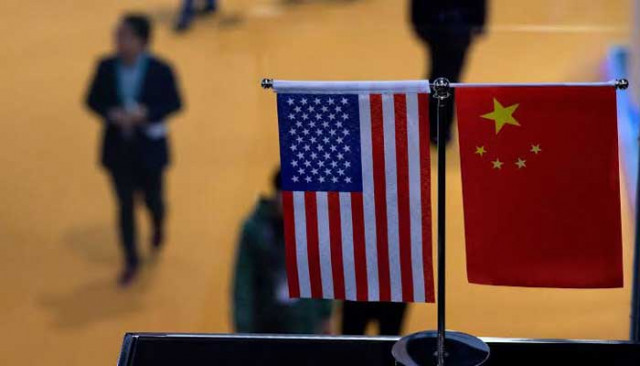US trade frictions dealt with proactively: China
Beijing says it has resolutely safeguarded interests of country and people

An AFP file photo showing US and China flags.
The US and China cooled their trade war this month, announcing a "Phase one" agreement that would reduce some US tariffs in exchange for what US officials said would be a big jump in Chinese purchases of American farm products and other goods.
China's commerce ministry has said it is in close touch with the US on signing the trade deal, and both sides are still going through necessary procedures before the signing.
Before the deal, US corn, sorghum, wheat, undenatured ethanol and refined copper cathodes face an additional tariff of 10% on shipments to China. Propane, cotton, aluminium scrap, copper scrap and rare earth magnets were all set for an additional 5% duty.
Below is a list and timeline showing how China’s tariffs on key US commodities and energy items will stand after the Phase one accord:
Crude oil
China imposed a 5% tariff on US crude oil shipments from Sept 1, the first time US oil had been targeted since the trade war between the world’s two biggest economies started more than a year ago. The 5% tariff will not be affected by the Phase 1 deal.
China, the world’s biggest crude importer, has cut US shipments from a record high last year. Chinese customs data showed imports in the first 10 months were halved year-on-year to 146,275 barrels per day.
Propane
China removed an additional 5% tariff on US propane shipments that was set to take effect from December 1. A 25% duty that China imposed on US propane on Aug. 23, 2018, remains in place.
Chinese firms process US propane into petrochemicals such as propylene. Imports last year were worth an estimated $2 billion.
LNG
China imposed a 10% punitive tariff on US LNG shipments in September 2018, raising it to 25% in June. LNG duties will not be affected by the deal.
Imports of the super-chilled fuel in the first 10 months of 2019 shrank 87.2% on the year to 258,955 tonnes, according to Chinese customs.
MEG
China imposed tariffs of 25% on US methanol, ethylene and glycol in June this year. They will not be affected by the deal.
Soybeans
No additional duties have been scheduled to come into effect after the deal.
A 25% tariff on soybeans in July 2018 had halted all buying by commercial buyers, but Chinese crushers went back to the US market following a trade truce in December last year. An additional 5% duty came into effect in September. The Chinese government has given tariff exemptions to some U.S. soybean imports.
China bought 11.3 million tonnes of soybeans from the US in January-October, down 31.8% from last year. The US has sold at least another 1.5 million tonnes of beans to Chinese crushers since early November.
Pork
American pork faces total import duties of 72% after including the 12% “most-favoured nation” tariff. These duties were not changed deal, but China is expected to boost US meat imports. An outbreak of African swine fever in China has decimated the world’s largest pig herd and sent domestic pork prices soaring to record levels.
Total import tariffs on US frozen pork will go down to 68% from Jan 1, when the cut in tariff rates on frozen pork shipments from all countries - which does not apply to carcasses, chilled pork and offal - takes effect.
Scrap metal
An additional duty of 5% on US aluminium scrap, which was to go into effect, has been cancelled. The material was already affected by an initial 25% tariff in April 2018, following by another 25% increase in August 2018.
Shipments to China were down only 17.3% year-on-year in the first 10 months of 2019, but those of U.S. scrap copper, subject to a 25% tariff since August 2018, crashed by 76.6% over the same period.
Rare earths
China, which this year raised the prospect of restricting rare earth exports to the United States but has not announced any formal measures, removed the extra 5% tariff on imports of US permanent rare earth magnets from December as part of the Phase 1 deal. A 25% tariff on US rare earth ore imports has been in effect since June 2019.
Most Southeast Asian stock markets ended higher on Friday, with Vietnam hitting a two-week closing high, buoyed by optimism that the United States and China were inching closer to signing a Phase 1 trade deal.
Optimism from progress in the trade negotiations has supported regional equities for the past two sessions, although trading remained subdued on account of the year-end holidays.
Leading gains in the region, Vietnam's main index tacked on 0.5%, recouping most of the losses it suffered earlier in the session, after data showed that its economy expanded at a better pace than targeted by the government in 2019.
Published in The Express Tribune, December 30th, 2019.
Like Business on Facebook, follow @TribuneBiz on Twitter to stay informed and join in the conversation.



















COMMENTS
Comments are moderated and generally will be posted if they are on-topic and not abusive.
For more information, please see our Comments FAQ